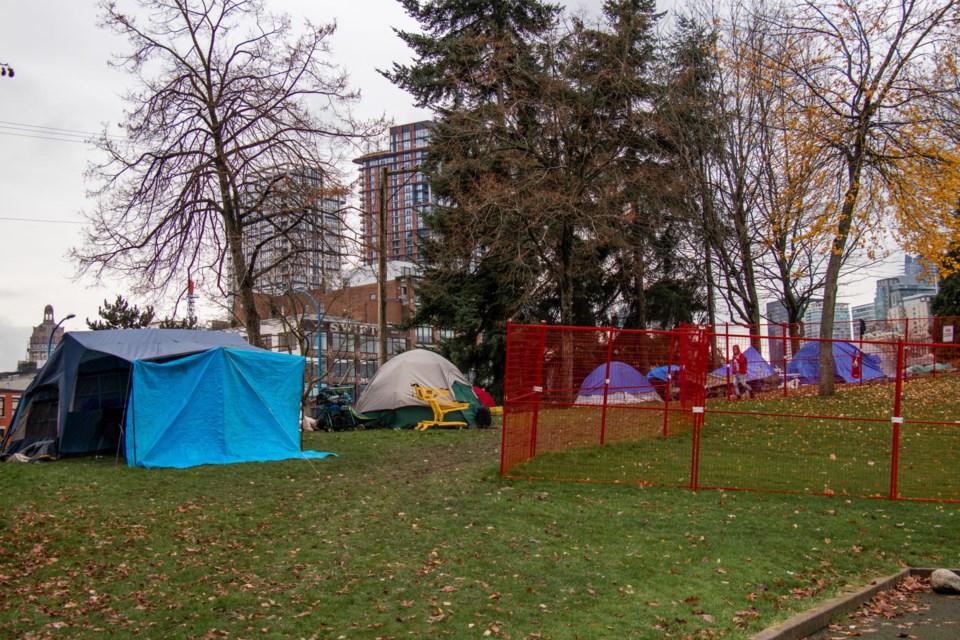When the BC government and City of Vancouver signed a deal for hundreds of millions of dollars to create new homeless shelter spaces last year, the terms were crystal clear: The city had to get serious about enforcing its bylaws and prevent any more tent cities from popping up in local parks.
It sounded plausible on paper.
After all, Attorney General David Eby had a blank cheque to get the job done and spent more than $250 million in one year purchasing hotels and other properties in Vancouver to open up hundreds of new spaces for low-income and supportive housing.
But Vancouver has struggled to uphold its end of the deal.
Last week, a BC Supreme Court justice suspended the city’s eviction notice to more than 50 campers at CRAB Park, which had sprung up after an earlier tent encampment at Strathcona Park was disbanded.
In doing so, Justice F. Matthew Kirchner, an aboriginal law expert who was only appointed to the bench a few months prior to his decision, threw a serious wrench into not only the agreement between the city and the province but also the fundamental approach both sides are taking to create and manage new spaces for the unhoused in the crisis.
The ruling is likely discomforting reading for Eby.
The Vancouver Parks Board tried to evict the tenters through two orders on July 8 and Sept. 7, 2021.
Two CRAB park campers, Kerry Bamberger and Jason Hebert, challenged the city’s eviction as unfair – both because they weren’t given a chance to be heard but also because the city unreasonably assumed there were actually enough shelter spaces for them if they were forced to move. Justice Kirchner ultimately agreed with both arguments.
The city tried to point to its mission to provide equitable access to parks for everyone, as well as its deal with the province that “through a Memorandum of Understanding (MOU) with the City of Vancouver and the Province of B.C., the Park Board has committed to preventing encampments in Vancouver parks and enforcing the Parks Control By-laws when there are suitable spaces available for unsheltered people to move indoors.”
But were there actually suitable spaces for the more than 50 campers at the park?
Parks Board General Manager Donnie Rosa argued she was “completely satisfied” that was the case, because she was in “regular conversation” with BC Housing through the summer and had been given a list of indoor shelter options that park rangers were distributing to campers along with the eviction orders.
Not good enough, ruled Justice Kirchner.
“The advice she relied on from B.C. Housing contained no particulars as to the numbers, locations, or suitability of the indoor spaces, and there is no evidence the General Manager sought out such particulars,” he wrote.
“In the circumstances, reasonableness required the General Manager to give serious consideration to both the constitutional rights of the Petitioners and the interests of the broader public… when making an order that engages, and potentially has significant and harsh consequences for, the constitutional rights to life, liberty, and security of a highly vulnerable population, reasonableness requires more than unquestioned reliance on conclusory statements provided by another government office.”
Rosa reminded the court that she was “bound to uphold the park board commitment to prevent the encampment continuing and expanding” as part of the deal with Eby’s office.
But Justice Kirchner shoved the MOU between the city and province back in the faces of both.
“Moreover, the MOU, which is expressly relied upon in making both Orders, recognizes that homelessness has ‘devastating consequences’ for individuals and calls for a ‘collaborative approach to bringing unsheltered residents indoors’, not a siloed one,” he wrote.
“Something more than bare assurances from B.C. Housing is called for by the MOU.”
Even if there were enough spaces, the city and province failed to ensure they were the right kind suitable for varying needs of the homeless people in the camp, he ruled.
Several campers shared their stories with Justice Kirchner about why existing shelter spaces were inadequate for them, ranging from safety issues, racism, and varying restrictions on gender, pets, shopping carts and mobility.
Others outlined how the provincial 211 Street and Shelter Help Line – which the city referred them to upon eviction – was a confusing, ineffective and unreliable source of information on actual spaces available.
All this should be worrying for the BC government.
The CRAB Park ruling tosses into question whether all the shelter beds being opened by the BC government are viable justification to shut down a homeless camp if they don’t match the needs of the campers.
It also casts serious doubt on whether the system BC Housing uses to share shelter bed information with campers and municipalities is reliable enough to allow municipalities to justify evicting tent city campers.
Vancouver and Victoria, which signed MOUs to clear parks of the unhoused in exchange for a combined $376 million in shelter spaces, will now be thinking twice about whether they have the right support from the province to survive court challenges.
Meanwhile, campers at CRAB Park cheered the decision.
"We're all overwhelmed ... We took on the system and we won," resident Clint Randen told the CBC. "It's a wonderful thing and it's a great day."
Not for the BC government though. For the province, the City of Vancouver and the Vancouver Parks Board, it’s back to the drawing board to find another approach that better balances camping in parks, public access to parks, shelter spaces and the rights of the unhoused.
Rob Shaw has spent more than 13 years covering BC politics, now reporting for CHEK News and writing for The Orca. He is the co-author of the national best-selling book A Matter of Confidence, and a regular guest on CBC Radio.



